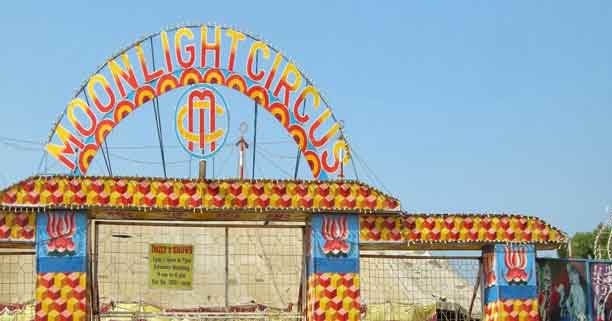No Fun At All
It’s one slip of the foot that has made all the difference. Ramina Kirpal, 14, was trying to board a moving train bound for Howrah along with two other circus escapees.
While the other two got in the train, Kirpal (not her real name) lost her footing and fell onto the platform at Thane, injured. She was picked up by the Railway Police where she narrated her story.
There was something fishy about the Moonlight Circus from the moment it set up camp in Goa in December. Its disregard for animal welfare was clear, and there seemed to be a sadness in the faces of the underage acrobats.
Yet it took Ramina’s slip to reveal the depth of the depravity of the circus’s owners. This is a story of rape, child abuse, animal cruelty and the worst kind of human trafficking.
It’s a story that began years ago in the far reaches of the Indian sub-continent, where unscrupulous men “purchased” children for the purpose of using them as circus performers, all the while inflicting on them unspeakable abuse. That all this went on for so many years without detection is a testament to the deficiencies of the Indian criminal justice system.
It’d be nice to say that the circus’s demise here in Goa is a tribute to the fine work of the police in our sunny state. The truth is, however, that it was Ramina’s slip – not the handy police work of the Goan authorities – that ultimately stopped the nightmare.
We spoke to an NGO worker closely involved with this case (she asked that her name not be used), and she told of a particularly bad day for Ramina and her two peers while the circus was stationed at Mapusa. According to this NGO worker, the circus owner and an aide attempted to rape Ramina, but she managed to escape their grasp.
Later that night, the three similarly aged girls jumped over the corrugated iron fence encircling their camp, fleeing into the night.
From Mapusa, they travelled unnoticed to Mumbai and from there, to Thane, where they attempted to board a Howrah-bound train when the incident happened.
Sold to a circus at the age of two, Ramina knew no other life. Police aren’t sure how the girls figured out which trains to catch, and to go in a direction that leads to “home.” Howrah in West Bengal is a major junction from which trains to several states like Assam, Bihar, Orissa run and would certainly take them to regions where they hail from.
Out of the 18 victims, six are minor girls, eight are minor boys below 14 years, and four are adults employed when they were minor. They were given no education as they were trained in the art of acrobatics and other circus acts from a young age.
The victims are now lodged at a state-run protective home. Police registered the rape case at the women’s police station in Panjim, and the human trafficking case at the Margao police station.
During the raid, seven Kenyans were identified, but all of them had valid employment visas.
The other two girls escaped successfully, and there has been no trace of them since. That leaves open the very real possibility that they are still in danger.
According to authorities, the victims were forced to work 20 hours a day without proper diet. This was besides being regularly sexually abused by the owners, their aides and others.
After the injured Ramina was handed over to the Railway Police, they according to procedure, contacted the NGO International Justice Mission – a US-based organization fighting slavery and sexual exploitation around the world. IJM in turn contacted a Goa-based NGO called Arz, who tipped off the state authorities. A carefully planned raid ensued.
According to what he has told the police, the owner, Abdul Khan took over the running of the circus from his brother around two years ago. Police are currently on the lookout for the brother.
The case has touched off a debate – and the beginning of possible legal action – involving the treatment of animals in Indian circuses. India is one of 11 countries around the world that have passed legislation restricting the use of animals in entertainment. Now the Central Zoo Authority and the Animal Welfare Board of India – pressured by the People for Ethical Treatment of Animals (PETA) – have indicated they may withdraw recognition of circuses as ‘captive animal facilities’, making it illegal for them to keep wild animals.
PETA is at the forefront of the fight.
“We hope the allegations of rape and human trafficking as well as the abandonment of animals used by the Moonlight Circus act as a wake-up call to the government to take a serious look at this abusive industry, which has a history of using unwilling participants, humans and animals alike,” says PETA India CEO Poorva Joshipura
PETA has written to the Goa Forest Department, police and the Animal Welfare Board of India to take immediate action to care for the animals. The Goa Forest Department reported that the circus organizers had already, on March 5 (the raid took place on March 1), moved the animals to Kudal in Maharashtra, where the circus was scheduled to have its next stop.
“They are now in the jurisdiction of the Maharashtra Forest Department,” Principal Chief Conservator of Forests Richard D’Souza said.
This has left the animals in Kudal along with a few workers, the rescued children in a government-run protective home in Merces, while the owner and five others are cooling their heels behind bars.




